Senior Lecturer in English & Creative Writing
Faculty of Arts, Science and Technology

English BA (Hons)
- Home
- Courses by subject
- English BA (Hons)
Key Facts
-
UCAS Code
BA: Q300
BA with Foundation: Q301 -
Level
UndergraduateUG BA (Hons)
-
Duration
Full Time: 3 years
Full Time Foundation: 4 years
Part Time: 4 - 6 years -
Starting
September
-
BCC at A Level or,
DMM at BTEC -
Full Time: £9,535
Part Time: £1,585 per 20 credit module
Integrated Foundation Year: £5,760 -
Full Time: £15,700
Integrated Foundation Year: £15,700 -
Waterside
Updated 27/03/2025
Updated 27/03/2025
Get in touch
For questions regarding study and admissions please contact us:
UK STUDENTS ENQUIRIES
study@northampton.ac.uk
0300 303 2772
INTERNATIONAL STUDENTS ENQUIRIES
Ranked 1st for English Studies in the National Student Survey 2024*
The University of Northampton’s dynamic and diverse English BA (Hons) degree provides a thorough exploration of English Literature, where you can plot your own pathways through a range of themed strands and in-depth module topics, all regularly taught by dedicated, enthusiastic and research-active tutors. We offer a supportive learning environment where you can feel safe and empowered to explore new ideas, develop your love of literature and learn vital life skills for your future career.
At the centre of our newly updated BA English programme is diversity and relevance. This means we study texts representing a range of voices and identities, embracing the latest cultural debates and searching out literary expressions from revolutionaries or the marginalised, but also looking deeply into the rich heritage and history of the literary arts across the ages and through the full range of literary genre. We care deeply about what literature can show us of the world in all its complexity, and the degree in English programme taps into this passion for hearing all voices and witnessing the history and breadth of literary expression.
*Calculations are based on Office for Students (OfS) data from the average positivity score across all NSS questions for this subject area across all modes and levels at UK Universities.
Highlights
-
- The English degree covers the most relevant and exciting module topics, led by research active tutors
- Optional modules in each year, arranged across a unique menu of themed pathways
- Teaching of the BA English degree takes place in small seminar groups (usually 15-25)
- Guaranteed paid internship with the Northampton Employment Promise
- HP laptop and software included with this course for eligible students* (*see Eligibility criteria and Terms and Conditions)

Image shows external view of the Creative Hub, which is a large modern multi-story building with curved design, large windows, and white façade. In front of the building, people walk and sit on a landscaped plaza with trees and benches.

Image shows a study area on the ground floor of the Creative Hub; it has bright and modern with large windows, light fixtures on the ceiling, colourful chairs, and students seated at tables.
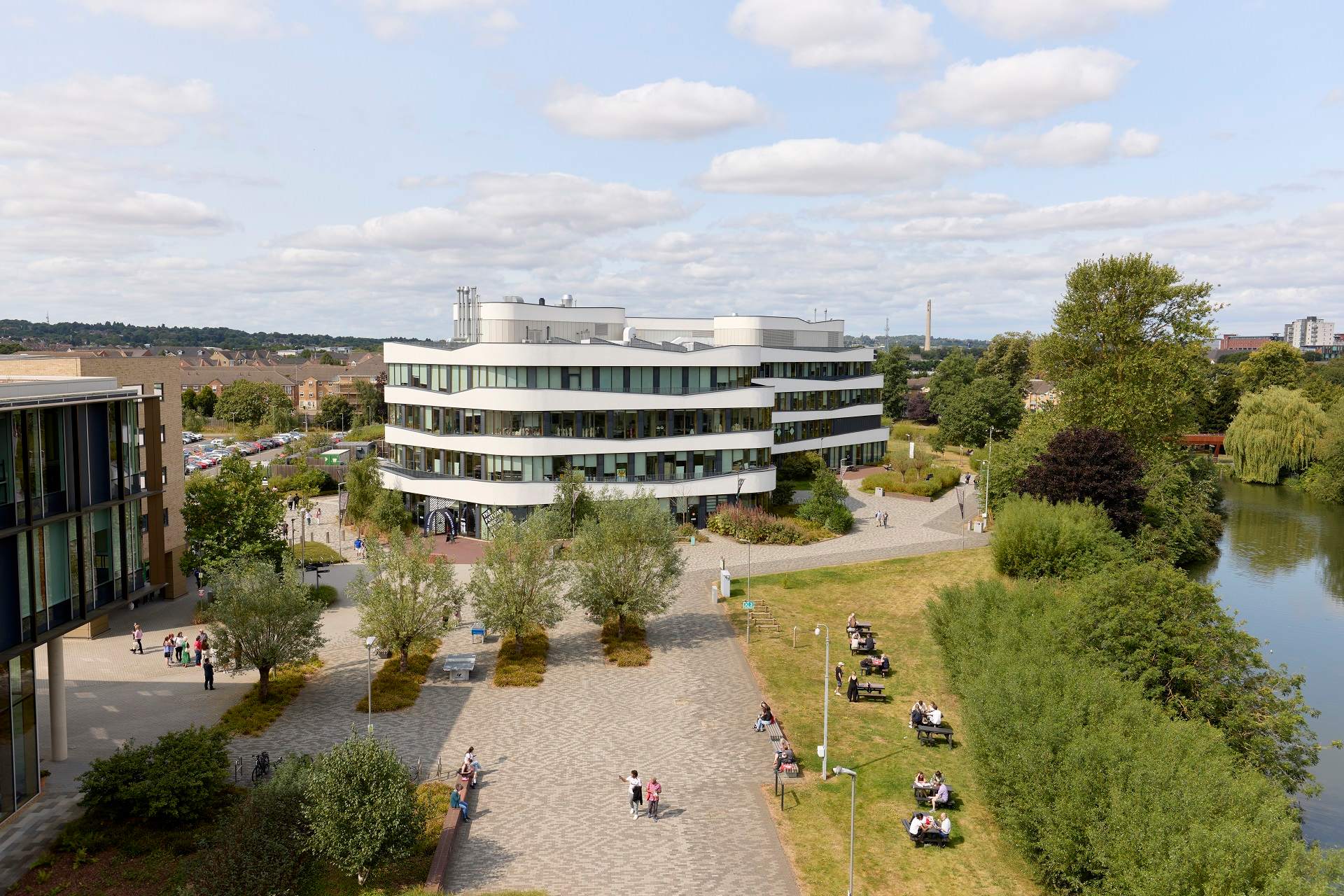
Image shows aerial view of the Creative Hub; a modern, curved building surrounded by greenery, paths, and people sitting or walking near a river on a partly cloudy day.
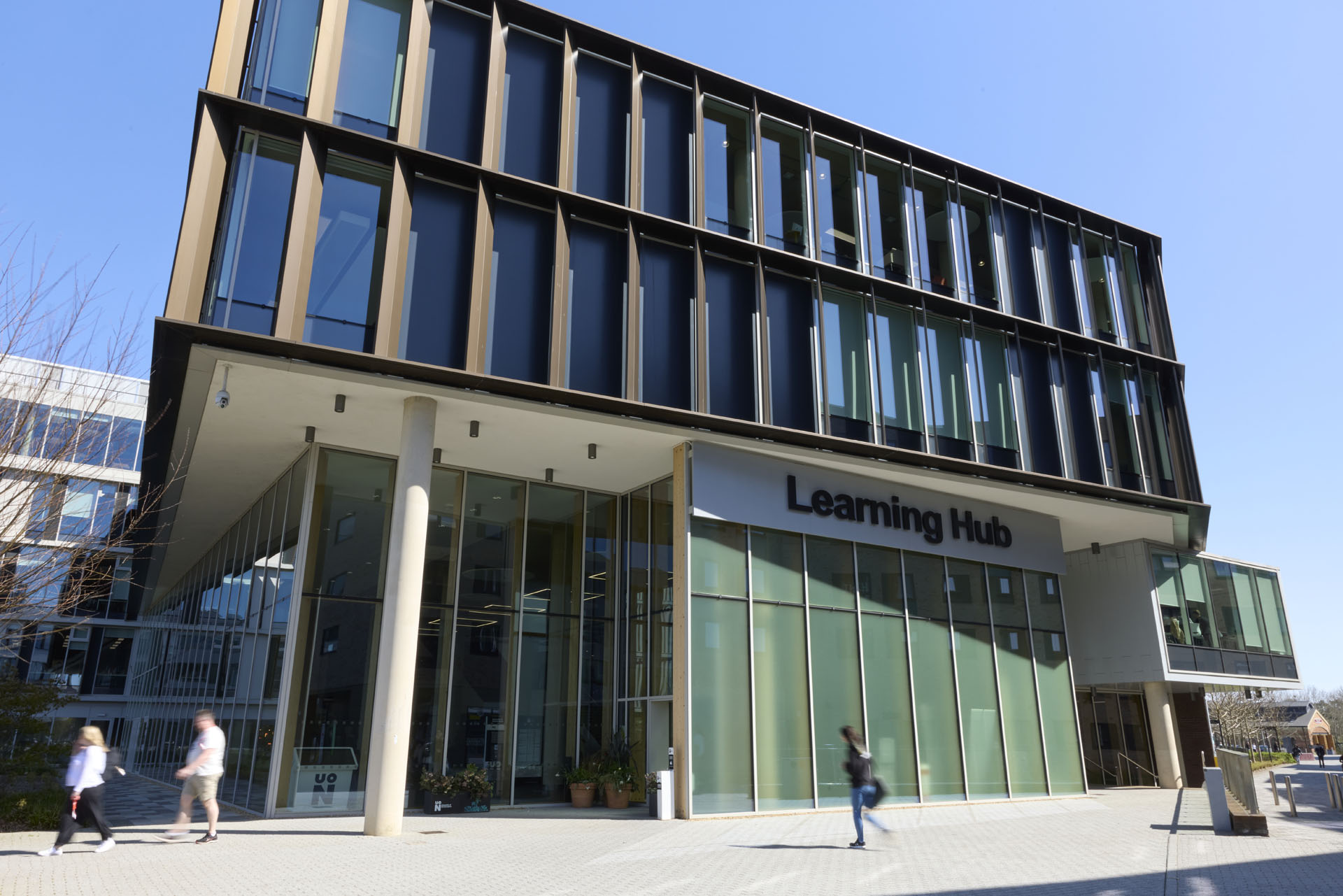
Image shows the main entrance to the Learning Hub, which is a large, multi-storied building with many large windows, with ‘Learning Hub’ in large letters on the front. It is a sunny day, and several blurred people are walking outside.
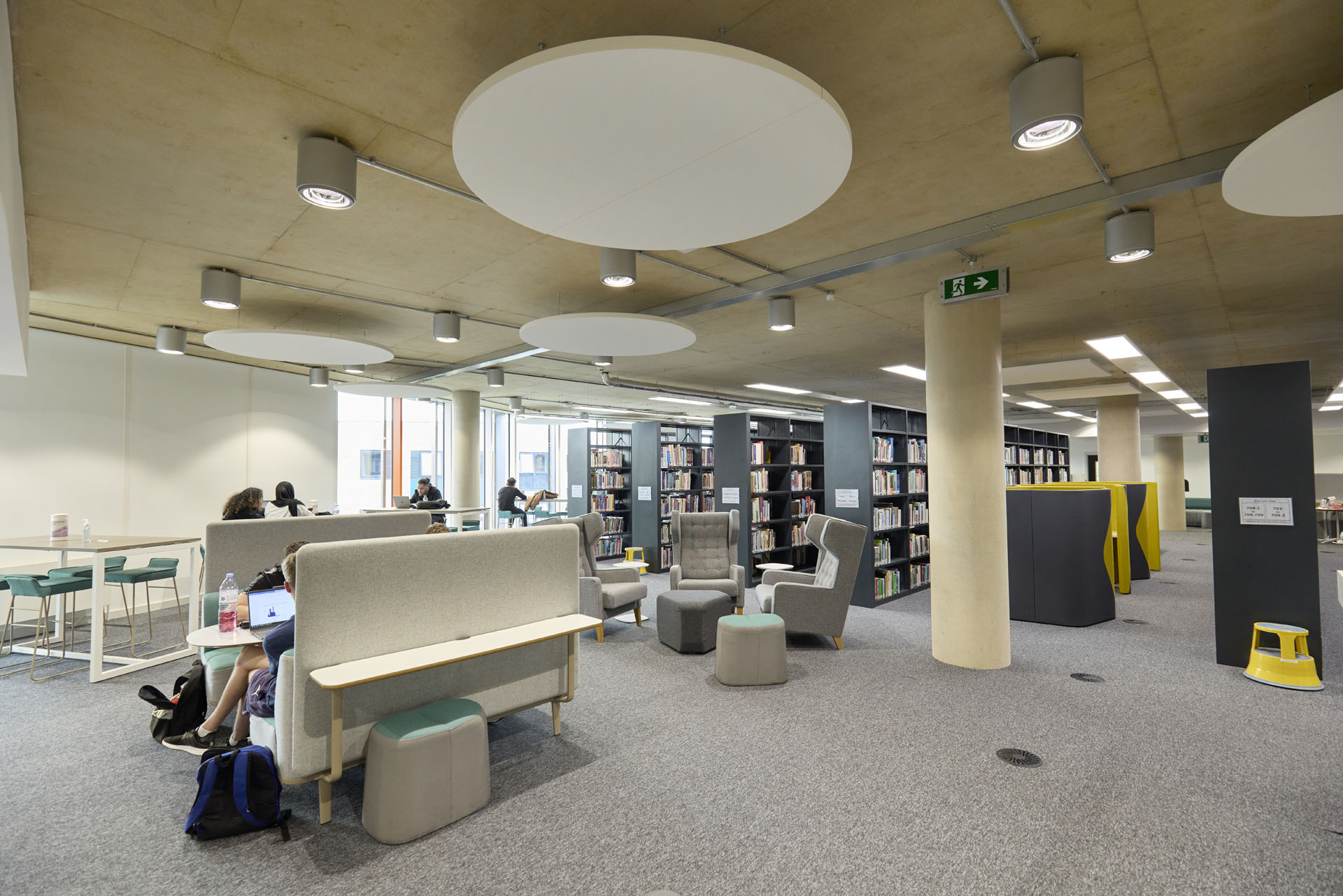
Image shows a modern library interior with people reading at tables and seated on cushioned chairs in the Learning hub. Shelves filled with books are visible in the background under circular ceiling lights.
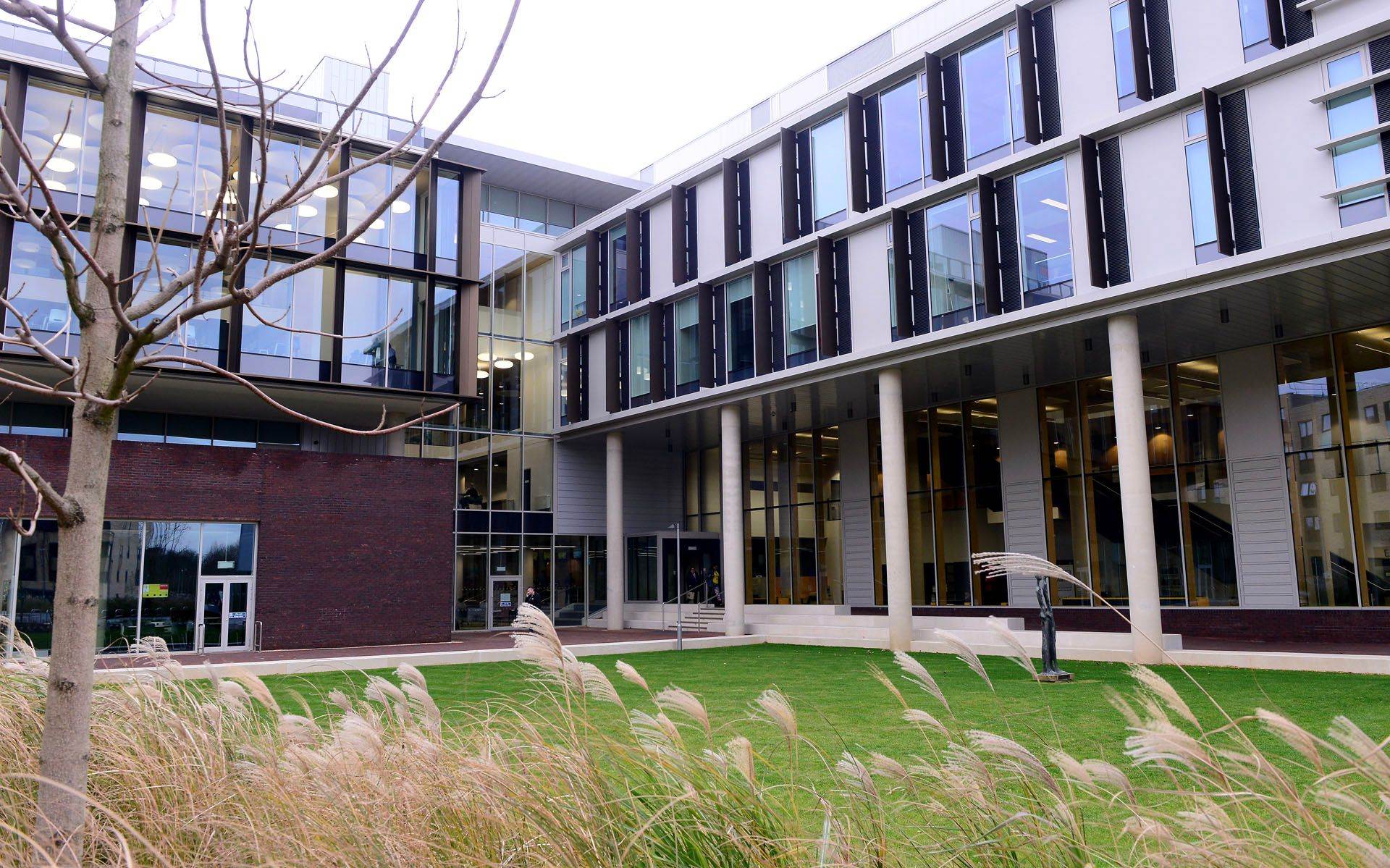
Image shows view of the lawn and courtyard outside the Learning Hub, featuring a bare tree, ornamental grasses, and an abstract sculpture. The building has several stories and features large windows.
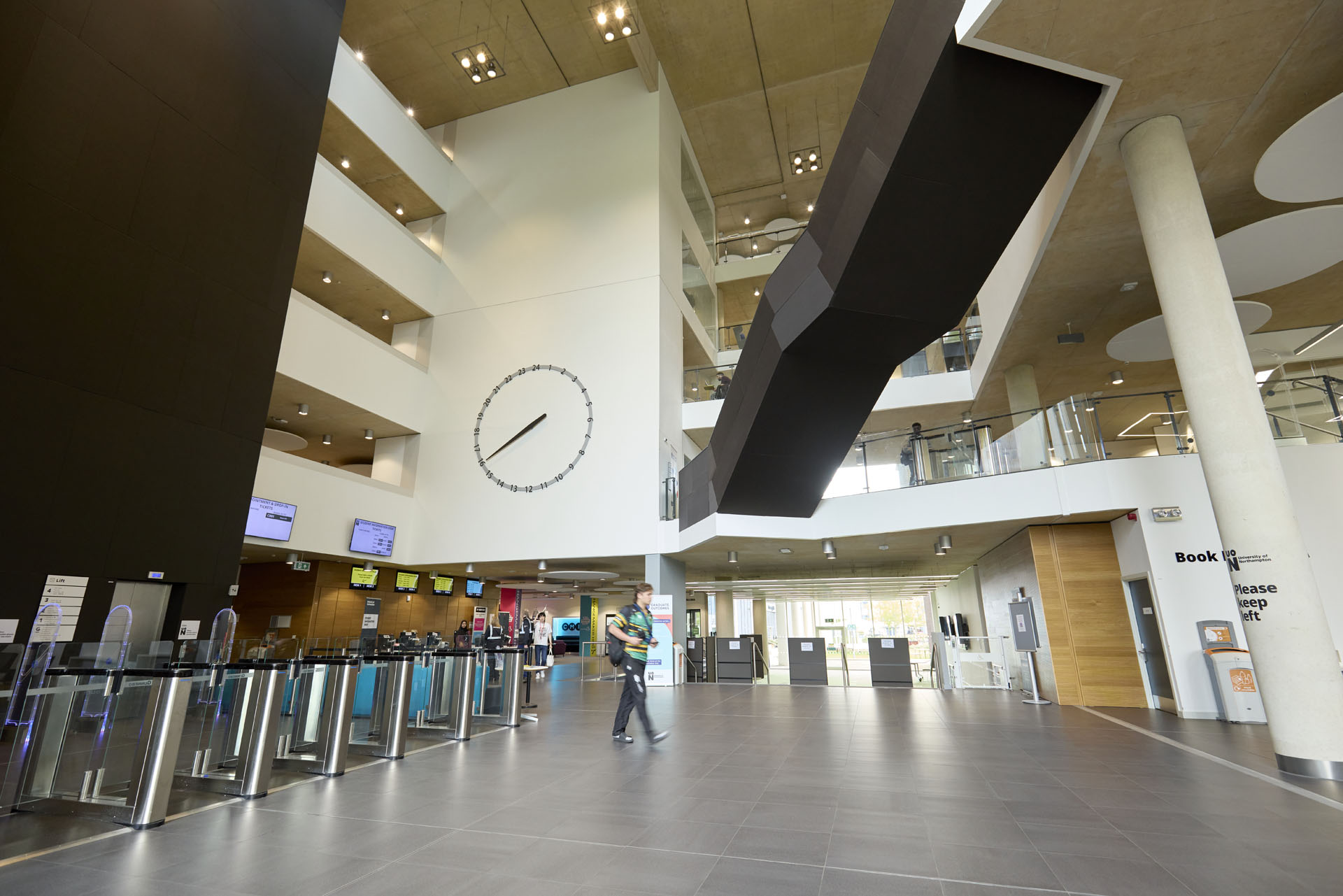
Image shows the ground floor of the Learning Hub; it is a large, modern atrium with high ceilings, a large clock on the wall, turnstile gates, and an angular black staircase. A student carrying a backpack is walking through the space.
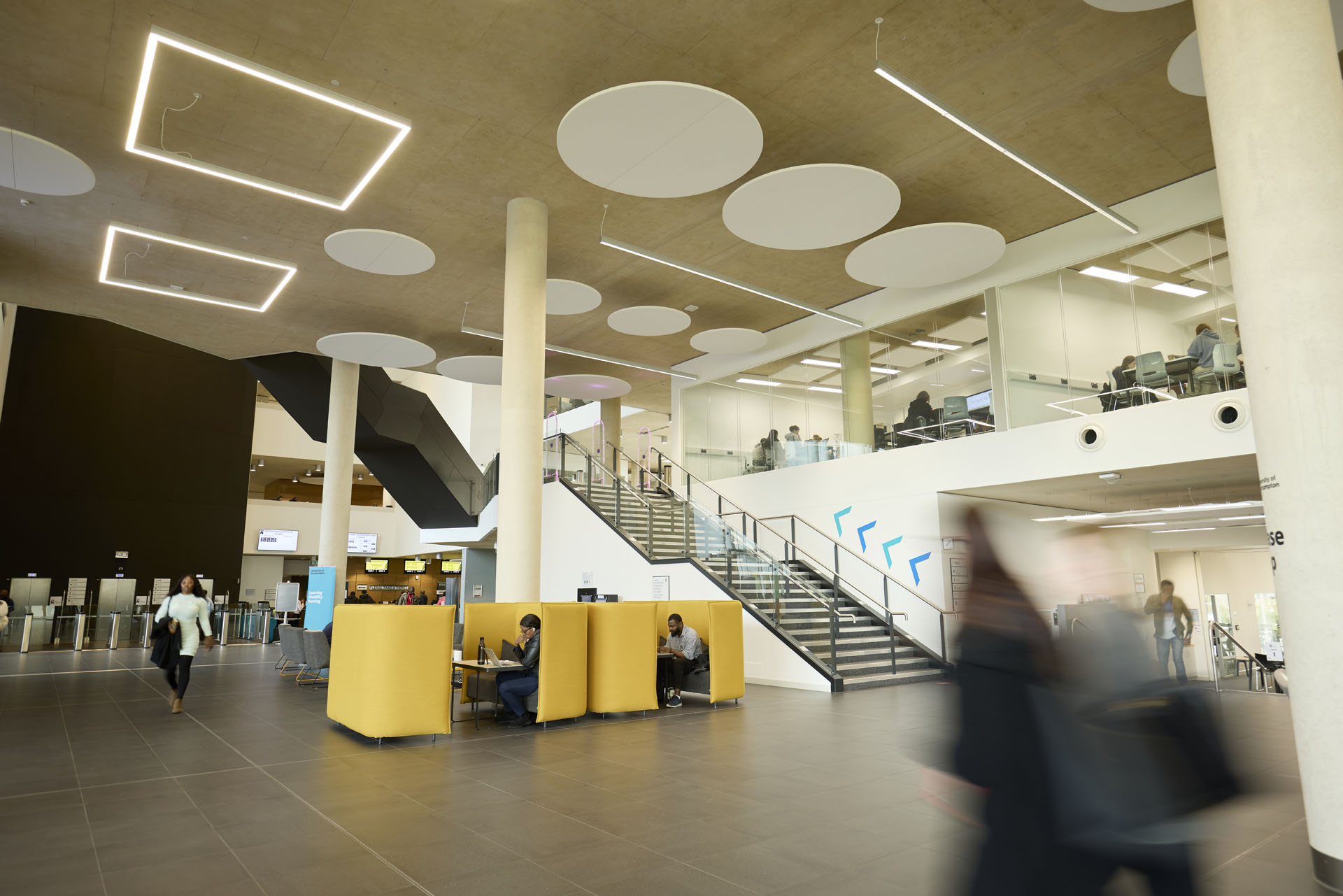
Image shows a large, modern lobby with high ceilings, circular light fixtures, and an upper floor visible. People are sitting on yellow seats and moving around. Stairs and a black staircase are also present.

Image shows external view of the Creative Hub, which is a large modern multi-story building with curved design, large windows, and white façade. In front of the building, people walk and sit on a landscaped plaza with trees and benches.

Image shows a study area on the ground floor of the Creative Hub; it has bright and modern with large windows, light fixtures on the ceiling, colourful chairs, and students seated at tables.

Image shows aerial view of the Creative Hub; a modern, curved building surrounded by greenery, paths, and people sitting or walking near a river on a partly cloudy day.

Image shows the main entrance to the Learning Hub, which is a large, multi-storied building with many large windows, with ‘Learning Hub’ in large letters on the front. It is a sunny day, and several blurred people are walking outside.
Entry Requirements
A typical offer for our English course would be:
- BCC at A Level or,
- DMM at BTEC/Cambridge Technical or,
- Pass (C and above) at T Level
-
For more information on how to make an application, please visit our How to Apply page.
We welcome applications from students with a mix of A levels and BTEC/Cambridge Technical qualifications.
If you are an International student and would like information on making an application, please see our How to Apply page.
-
Admission to this foundation course is normally:
- DEE at A Level or,
- MPP at BTEC or,
- Pass (D or E) at T Level
However, we would also like to hear from you if you have professional or industry experience instead, a range of other qualifications or self-developed subject knowledge that relates to the course you wish to study.
-
All International and EU students applying for a course with the University of Northampton must meet the following minimum English language requirements:
- IELTS 6.0 (or equivalent) with a minimum of 5.5 in all bands
for study at undergraduate level
For information regarding English language requirements at the University, please see our IELTS page.
- IELTS 6.0 (or equivalent) with a minimum of 5.5 in all bands
Student Story
Imogen’s Story
’If I had three wishes, one of those would be to do the English degree at UON again.’
Imogen shares her experience of being an English student at the University of Northampton.
Course Content
-
The modules on this English BA (Hons) degree course are organised into distinctive strands that allow students the chance to develop their knowledge from year to year and apply skills they’ve learned across different stages. For example, in a strand called ‘Rethinking Identities’, we raise the question of which authors are taught right from the start in a module called ‘Decolonising the Bookshelf’, with a particular focus on race and ethnicity. But these same ideas return in the second year of the BA English degree with ‘Representing Class: Stories and Conflict’ and in the third year with ‘Bodies and Performances: Sex and Gender’, and in this way students are able, if they choose, to fully develop their understanding of literary expression, representation and recognition across a broad range of literary texts.
While one strand focuses on literary periods, perspectives and historical contexts, another focuses on types of writing and other media in the digital age, or how society both shapes and is shaped by literature. Yet none of the strands exist in isolation, with meaningful connections between modules in each level. While one strand is focused on skills and applications – with explicit focus on how to develop your abilities on the programme and for the workplace beyond – these skills are used and developed in every module, and every strand offers opportunity to demonstrate your employability.
What’s more, all our BA English modules are rooted in staff expertise and a shared passion for literature. In offering modules focusing on ecology and the environment, children’s and young-adult writing, contemporary revisioning of the works of Shakespeare, American literature and culture, gothic worlds, and digital culture, the course offers every student a breadth of topics that will stimulate your imagination and hone your critical thinking. By your final year, you get to follow your own passions and expertise, by selecting a dissertation on a literary topic of your choice and really showing what you can accomplish.
The team of English degree lecturers is big enough to offer a variety of modules, but small enough to provide you with a close-knit learning environment. You will know your tutors personally and see them regularly and you will regularly find someone to help you with your academic study, and to provide pastoral support hand-in-hand with Northampton’s excellent student support services.
Please note the modules shown here relate to the academic year 24/25. The modules relating to the academic year 25/26 will be available from June 2025.
-
-
Identity under Construction (20 Credits)
Module code: LIT1037Status: DesignateThis module offers an introduction to British Literature post-1945 to the present day. It considers key developments in poetry, drama and the novel in the context of literary movements and social change.It examines a range of writers portraying the mainstream and margins of British culture. It is designed to develop students' skills in reading a variety of contemporary genres, and to encourage them to begin to apply theoretical and critical considerations to liteature.
-
Contemporary Shakespeares (20 Credits)
Module code: LIT1038Status: DesignateThe purpose of this module is to introduce students to the study of Shakespeare?s plays at University level (along with essential historical backgrounds and scholarly methodolgies) and to explore the range of meanings illuminated in the plays by contemporary cultural concerns, recent critical perspectives, and forms of adaptation into other artforms and media, including film and stage performance. Students will be encouraged to play an active role in debating these meanings and advancing persuasive arguments in defence of their own interpretations, thus enhancing key analytical and evaluative skills for degree-level study of English.Note: For the Essay with Annotated Bibliography assignment, students will be expected to write about themes and interpretations of the plays, using a range of contemporary perspectives. The focus of the Presentation will be upon contemporary cultural uses and appropriations of Shakespeare.
-
Digital Culture and Print Media (20 Credits)
Module code: LIT1045Status: DesignateThe purpose of this module is to introduce students to the relationship between literature and evolving media culture and technologies, with emphasis on the modern age. Understanding print and digital formats within mediated cultural frameworks allow for exploration of contemporary understandings of new skills and capabilities for reading now.
-
Decolonising the Bookshelf (20 Credits)
Module code: LIT1046Status: DesignateThis module takes up the challenge of the Black Lives Matter movement to ask the question: what does it mean to decolonise the literary canon? It explores literary representations of global ethnic majorities within a range of texts written in English and drawn from different historical periods.
-
Writing the Wild (20 Credits)
Module code: LIT1047Status: DesignateThis module explores literary representations of the natural world and the diverse ways in which writers have responded to the wild and the non-human. The module emphasises the significance of literary texts in contributing to contemporary debates regarding our relationship with the environment and other animals.
-
American Dreams, American Nightmares: Race, Class and Gender (20 Credits)
Module code: LIT1048Status: DesignateThe purpose of this module is to provide students with a survey of key American texts and writers from the Colonial period to the Middle of the Twentieth Century to explore how literature offers perspectives on the key thematic and formal concerns of US fiction.
-
Reading and Writing Our World (20 Credits)
Module code: LIT1049Status: DesignateThe purpose of this module is to introduce students to the dual roles involved in the construction of textual meaning: writing and reading. In exploring imaginative and critical reading and writing practices in a range of genres, students will engage in identifying the relevance of textual creativity to real-world applications.
-
Identity under Construction (20 Credits)
-
-
Victorian Visions (20 Credits)
Module code: LIT2056Status: DesignateThe purpose of this module is to introduce students to a diverse range of writers and texts from the Victorian period, situating them in the context of the major cultural and political changes of the era, whilst also considering how the period has been reimagined in neo-Victorian literature.
-
Literature & the Real World: Critical Concepts (20 Credits)
Module code: LIT2065Status: DesignateThis module provides students with a grounding in literary theory and criticism, considering this in light of how these areas relate to `the real world?. This will involve the study of major theorists, terms, concepts and perspectives underpinning key approaches in the field.
-
Literary Extremes and the American Mainstream (20 Credits)
Module code: LIT2066Status: DesignateThe purpose of this module is to analyse ways in which American fiction responded to key events and issues of the post World War 2 period such as changing perceptions of mental health, race, gender and sexuality; the counter culture; consumerism; rebellion and conformity.
-
From Fairy Tale to Fantasy: Children's and Young Adult Literature
Module code: LIT2067Status: Designate
-
Centre & Margins: Postmodernity & After (20 Credits)
Module code: LIT2068Status: DesignateThis module examines city literature via the framework of postmodernism. It considers the central place the city holds in the literary imagination and the relationship between center and periphery. It does so through the lense of contemporary critical and theoretical perspectives, questioning the continued relevance of postmodernism.
-
Writing in the World (20 Credits)
Module code: LIT2069Status: DesignateThe purpose of this module is to provide opportunities to study nonfiction writing across a range of purposes, genres and registers, and to explore applications of these forms of writing to real-world and work-based environtments. Students will learn skills in assessing external briefs and effective writing for purposes that extend beyond scholarship or the classroom. An element of the module will be delivered in the context of live-client briefs and work-informed learning.
-
Representing Class: Stories & Conflicts (20 Credits)
Module code: LIT2070Status: DesignateThe purpose of this module is to explore textual representations of class alongside critical and theoretical conceptualisations and responses. This module is designed to explore various forms of social class-identities, including constructions of class consciousness and the ?making? of the archetypes and class ideals within textual representation.
-
Victorian Visions (20 Credits)
-
-
Gothic Worlds 1750-1900 (20 Credits)
Module code: LIT3068Status: DesignateThe purpose of this module is to examine the development of Gothic Literature from its inception in the mid eighteenth century to the modernized urban Gothic of the late nineteenth century. The module will situate the genre in its wider cultural and historical contexts and consider how the Gothic imagination expresses itself aesthetically, culturally and politically during this period.
-
Good Society and Bad Society: Shakespeare to Behn (20 Credits)
Module code: LIT3075Status: DesignateThis module explores ideas of human freedom and social justice in the literature of the early modern period, linking art?s utopian potential and historical liberation struggles. It examines a range of genres and authors in the light of their cultural, historical and intellectual contexts, and discusses their relevance to today.
-
Literature and Revolution (20 Credits)
Module code: LIT3076Status: DesignateThe purpose of this module is to critically evaluate literature which in someway can be considered as representing, evoking, or playing a part in revolution. The texts studied represent diverse literary forms and modes of literatures which address moments of social upheaval, ideological change, or innovation, including within literary form itself.
-
Bodies and Performances: Thinking Sex and Gender (20 Credits)
Module code: LIT3077Status: DesignateThe module examines a range of literary texts in the modern period in the light of changing and ongoing debates about sex, gender and sexuality. Focusing on the representation of bodies and/in performance, it examines works by writers from a variety of backgrounds including writing by women and sexual minorities.
-
Publicity & Privacy: American Authors and Celebrity (20 Credits)
Module code: LIT3078Status: DesignateThe purpose of this module is to explore the relationship between modern American literature and the emergence of new cultures of publicity and celebrity from the late ninteenth to the twenty-first century. It will explore specific tensions in the modern age between public and private versions of the self.
-
Texts in Transition: Adaptation (20 Credits)
Module code: LIT3079Status: DesignateThis module critically examines the variety of processes that can be considered under the aegis of 'adaptation'. Students explore the changing ideological and economic relationships between the source text and its adapted forms through theories of authorship, fidelity, intertextuality and genre. Students are encouraged to consider the intellectual and creative tensions that exist in cross-media retellings of print material.
-
English Dissertation (40 Credits)
Module code: LIT4016Status: CompulsoryThe purpose of this module is to provide an opportunity for students to develop, at length, a particular disciplinary interest. This may derive either from study in the first two years of the degree, or from reading and/or practice activities on their own initiative. In either case, they will bring to bear on their subject matter the analytical techniques learnt during their degree.
-
Gothic Worlds 1750-1900 (20 Credits)
-
-
At the University of Northampton, everything we do, from funded trips to paid internships, is to give you everything you need to make a difference when you leave.
If you join this full time BA English degree at Northampton, you will receive a laptop when your course begins*. The laptops are built to a bespoke custom specification ideal for use in the seminar room, collaborative group work or studying at home.
Whatever your ambitions, we’re here to help you to achieve them. We’ll support you to identify the skills you’re learning during your course, find your strengths and secure practical experience so that when it comes to applying for jobs or further study you’ll feel confident in standing out from the crowd. We’ve created the Northampton Employment Promise because we are so confident that if you focus on your studies and complete one of our awards you’ll be highly employable by the time you graduate. Putting you in a great position to secure employment or continue your studies.
To check out the full list of perks, visit our Student Perks page or dedicated International Perks page.
*UK fee payers only (see Terms and Conditions for further details).
-
The Integrated Foundation Year (IFY) offers a new and exciting route into studying for a degree, attracting ambitious and driven students who are willing to learn and advance.
If you have non-standard qualifications or do not quite meet the admissions requirements for the degree in English, we can offer you a fantastic opportunity to study a four year programme which includes an Integrated Foundation Year. The Integrated Foundation Year will help you develop the theoretical/practical and academic skills you need, in order to successfully progress to the full award.
Our four-year courses will enable you to successfully follow the degree pathway of your choice while gaining essential study skills. The foundation year of your chosen degree will be studied on a full-time basis and is aimed at supporting the transition to higher education. Years two, three and four are then studied as a standard degree programme.
-
How will I be taught on the English BA (Hons) degree?
English modules are assessed through a variety of methods, including essays, individual and group presentations, blogs, participation in online discussion groups, creative writing, podcasts and formal examinations. From the outset on the English BA degree, we teach you the skills you will need through your degree and transferable skills that will be vital to your career.
You will engage with texts through extensive reading and consolidate your own responses by studying intellectual, theoretical and historical contexts. You will be taught through seminars and group discussions which will critically inform your ideas and allow you to share and discuss them with your fellow students.
We also provide the chance to develop your writing and apply your understanding of the world to employment-related tasks, with opportunities for working toward live-client briefs (where your success is measured against what real-world employers are looking for, rather than sticking only to tutor-led assessment briefs), to get a direct taste of work-based learning and real employment environments.
Are there any specialist facilities and features?
On the degree in English, you will benefit from:
- a range of optional modules for flexible learning
- thematic strands developing ideas from the first year to the last
- a broad range of modules focused on relevance and diversity
- opportunities to study American literature
- work-based learning and employability skills
- a diverse range of assessment methods
Worried about student finance?
Get all the info you need ahead of time, before you can apply for funding in Spring on our fees and funding pages.
Fees and Funding
2025/26 Tuition Fees
- UK – Full Time: £9,535
- UK – Part Time: £1,585 per 20 credit module
- UK – Integrated Foundation Year: £5,760
- International – Full Time: £15,700
- International – Integrated Foundation Year: £15,700
Fees quoted relate to study in the Academic Year 2025/26 only and may be subject to inflationary increases in future years. UON will adjust UK fees annually in line with Government Policy.
-
We do ask that you buy the prescribed primary texts for each module. We carefully review the costs of every module each year, so that they do not exceed £100 per module. In practice, by using libraries, freely available online resources and second-hand copies of books, costs are often less than half of this total figure.
On the English BA degree, you will have the chance to attend a range of research seminars, conferences, field trips and other activities beyond the curriculum for free or at minimal cost.
-
For information on the scholarships available to you, please see our scholarships page.
For more information about possible funding options, please visit our Fees and Funding pages.
-
Fees quoted relate to study in the Academic Year 24/25 only and may be subject to inflationary increases in future years.
- UK – Full Time: £9,250
- UK – Part Time: £1,540 per 20 credit module
- UK – Integrated Foundation Year: £9,250
- International – Full Time: £15,200
- International – Integrated Foundation Year: £15,200
Staff

Senior Lecturer in English & Creative Writing
Faculty of Arts, Science and Technology
Phillippa Bennett

Senior Lecturer in English & Creative Writing
Faculty of Arts, Science and Technology
Richard Chamberlain

Senior Lecturer in English & Creative Writing
Faculty of Arts, Science and Technology
Phillippa Bennett

Senior Lecturer in English & Creative Writing
Faculty of Arts, Science and Technology
Richard Chamberlain

Senior Lecturer in English & Creative Writing
Faculty of Arts, Science and Technology
Phillippa Bennett
Careers and Employability
English BA degree students who have studied with us have gone on to a variety of careers, including:
- teaching
- adult education
- journalism
- theatre management
- marketing
- editorial work with major publishers
- librarianship
- arts administration
- museum and curatorial work
- librarianship
- bookselling
- social work training
- management trainee schemes with large companies
- local government
In addition, many BA English students go on to master’s study, including the University of Northampton’s Contemporary Literature MA.





